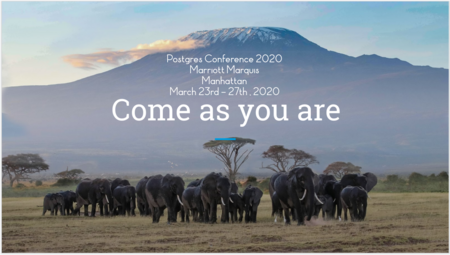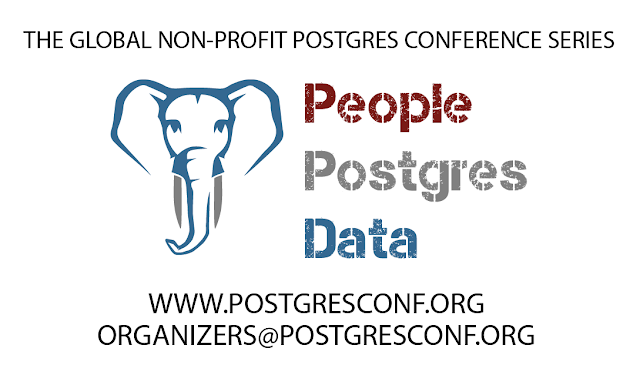
What is the future of Postgres?
When you observe the ecosystem you can’t help but ask yourself where the community and software is going next. It is without question that the future of data will reside in something Postgres. It may be PostgreSQL, Cockroach, Yugabyte, Aurora, Azure, or workload specific Postgres such as Greenplum. Based on the sheer number of successful software adventures that are based on Postgres, there is no doubt in our minds that it is the future.
This is why the inclusivity of People, Postgres, Data is vital to the continued success of the community. It is also why we invite all of Postgres to Come As You Are from March 23rd - 27th, 2020 at the Marriott Marquis in Manhattan!
Isn’t Postgres, PostgreSQL?
Yes, and no. It is true that the term Postgres is sometimes used as a short version of PostgreSQL which allows easier pronunciation of the project and software name. It is also true that PostgreSQL contains a great deal of Postgres code but it is not technically Postgres. In fact, Postgres predates PostgreSQL by quite a few years and had an interim fork called Postgres95 before the PostgreSQL project was founded. That is why we use Postgres as an inclusive term for all software Postgres including many that some would consider forks. Fun fact: Did you know that Informix is based on Illustra, a commercial Postgres fork from 1997?
Call for Papers
We are actively seeking people to deliver exceptional educational opportunities at Postgres Conference 2020. Postgres Conference is the perfect opportunity for students, hobbyists, and professionals to exhibit their knowledge in solving problems that are People, Postgres, or Data related. Submit your proposal today.
Instructor lead Digital Training
We have the following training opportunities in November and December:
- November 12th: PostgreSQL Performance and Maintenance
- November 14th: Finding and Fixing Slow Queries in PostgreSQL
- November 21st: PostgreSQL and Kubernetes
- December 10th: PostgreSQL Replication deployment and best practices
- December 12th: PGPool-II: Performance and best practices
Webinars
We have the following webinars in November:
- Nov 13: Designing a Change Data Capture and Two Data Center Architecture for a Distributed SQL Database
- Nov 14: Yugabyte DB 2.0 Jepsen Test Results and Distributed Transactions Algorithms in Google Spanner, YugabyteDB and CockroachDB
- Nov 20: Zero Down-Time Oracle to Cloud-Native PostgreSQL Migrations
Interesting projects
- http://postgrest.org/en/v6.0/ PostgREST is a standalone web server that turns your PostgreSQL database directly into a RESTful API. The structural constraints and permissions in the database determine the API endpoints and operations.
- https://www.haproxy.org/ HAProxy is a free, very fast and reliable solution offering high availability, load balancing, and proxying for TCP and HTTP-based applications. It is particularly suited for very high traffic web sites and powers quite a number of the world's most visited ones. Over the years it has become the de-facto standard opensource load balancer, is now shipped with most mainstream Linux distributions, and is often deployed by default in cloud platforms. Related content.




